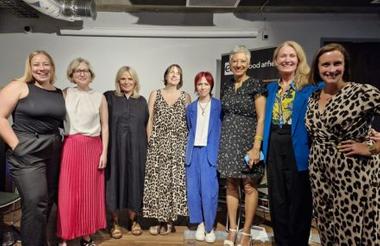“There is rigid career progression. You basically have to wait for your manager to move on to then compete with your peers for one job, rather than having genuine experience-based progression and pay increases.”
This is one woman’s experience of the charity sector, shared with the Women in Charity Network in its recent members survey, conducted to find out what barriers women are facing in the sector and what the network can do to help us all overcome them.
Unsurprisingly, concerns about stunted career progression, both in terms of roles and pay, shone through. More than two in five respondents described this as the biggest challenge facing women working for charities.
Though every woman’s experience of the sector is different, some survey respondents told us they were frustrated by a lack of training and development opportunities to help prepare them for the next steps in their career, including peer mentoring opportunities.
Others told us that they felt poor, or average, senior leaders blocked progression – at times for years on end. This can often be worsened by thin organisational structures in charities and lack of succession planning, which can create a bottleneck meaning some people have to wait for their manager to leave before they stand a chance of getting a promotion.
Pay packets
Poor pay packets were also on people’s minds. Charity salaries have trailed behind other industries for years, with the average salary for charity workers standing at around £2,500 less than the UK average across all sectors. One network member said “the expectation of officers to live in London on £25,000 is wild”, with another calling out charities who “expect that people should work for next to nothing”.
Poor progression and pay are clearly significant issues facing women in the sector. But what’s important to remember is how this affects power structures.
What drove us to start the Women in Charity Network, more than a year ago now, is to challenge the inequality in power that prevails in the sector. There has been a lot of progress over the last decade, but there is still a long way to go.
Evidence shows that despite women making up around 68% of the voluntary sector workforce, and women and girls being far more likely to rely on charity services, men continue to outnumber women on charity boards.
While around two-thirds of charity chief executives in the country are women, only 38% of the largest charities have a female CEO.
According to ACEVO’s research published this week, 63% of female charity CEOs lead organisations with an income under £1m, compared with 51% of male respondents. This disparity continues to drive a gender pay gap of over 10% between male and female CEOs.
Structural barriers
Women, particularly those from minoritised backgrounds, continue to face exclusion from the rooms where it matters. The reasons for this are complex, inter-twining and structural, creating additional barriers to female career progression.
One of our expert speakers at our recent event – Jenny Jarvis, author, leadership coach, and chief operating officer of the Energy Savings Trust – explained this clearly.
In reviewing the data provided by Women in Charity Network members, she said that barriers to progression can include: performance management systems being skewed to reward traditional male traits, a lack of female role models, organisational culture traits which are not as welcoming for female colleagues, and how women are received when they do challenge authority or act in a way which is deemed to be more directive rather than supportive.
Jenny said: “We know from a wealth of evidence that there are compounding factors in how organisations are designed, structured, and run which can create additional barriers for female career progression. These challenges seem particularly prevalent in the charity sector.”
We want to change that. If charities are serious about equality, they need to dismantle the structural barriers that keep women out of decision-making roles and proactively ensure women from all backgrounds and identities are represented at every level.
This is where we hope the Women in Charity Network can help. By providing a space for women to share knowledge and insight, build networks and empower one another, we want to build a movement of women fighting for good.












